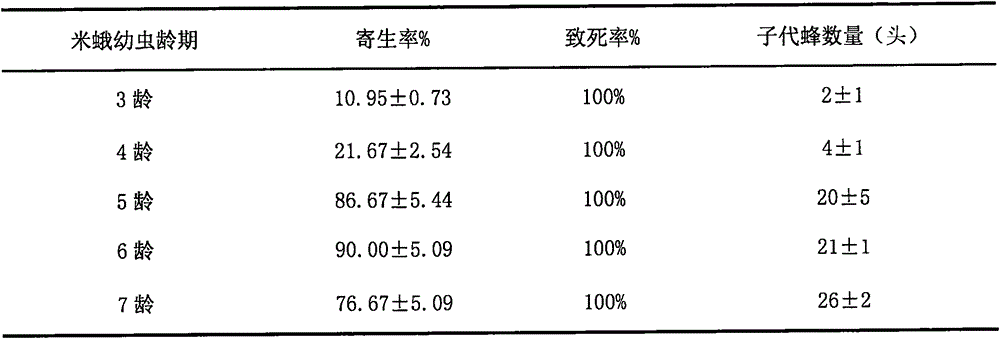Method for mass reproduction of Bracon adoxophyesi Mimanikawa
A technology of the brown banded moth Braconis and rice moth, which is applied in animal husbandry and other fields, can solve problems such as labor-consuming, time-consuming, heavy workload, and difficulties, and achieve high-efficiency breeding process, save labor and time, and have good parasitic effects Effect
- Summary
- Abstract
- Description
- Claims
- Application Information
AI Technical Summary
Problems solved by technology
Method used
Image
Examples
Embodiment Construction
[0019] In order to make the object, technical solution and advantages of the invention clearer, the present invention will be further described in detail below in conjunction with the examples. It should be understood that the specific embodiments described here are only used to explain the present invention, not to limit the present invention.
[0020] A method for large-scale reproduction of the brown scalloped wasp, the method comprising the following steps:
[0021] 1. Host reproduction:
[0022] Spread a layer of feed with a thickness of 1.5 cm in the feed pan. The feed ingredients include 70 parts of corn flour, 20 parts of wheat bran, 7 parts of white granulated sugar, and 3 parts of yeast in parts by weight. When preparing the feed, mix corn flour and wheat bran Put it into a drying box, keep the temperature at 80°C and heat for 4 hours to kill the germs, pests, mites and their eggs in the feed, sprinkle the rice moth eggs evenly on the feed, and then use a sieve to s...
PUM
 Login to View More
Login to View More Abstract
Description
Claims
Application Information
 Login to View More
Login to View More - R&D
- Intellectual Property
- Life Sciences
- Materials
- Tech Scout
- Unparalleled Data Quality
- Higher Quality Content
- 60% Fewer Hallucinations
Browse by: Latest US Patents, China's latest patents, Technical Efficacy Thesaurus, Application Domain, Technology Topic, Popular Technical Reports.
© 2025 PatSnap. All rights reserved.Legal|Privacy policy|Modern Slavery Act Transparency Statement|Sitemap|About US| Contact US: help@patsnap.com

